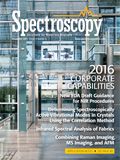Ocean Optics
Company Description
Ocean Optics provides applications such as biomedical and life sciences research, food safety and authentication, agricultural monitoring, science education, and quality control. The company has specified and delivered more than 230,000 miniature and modular spectrometers over the past two decades. As our customers' needs have evolved, we've expanded our capabilities and strengthened our product portfolio. Throughout, our focus has remained the same: to empower science and industry through collaborative problem-solving.

Ocean Optics also provides a comprehensive range of complementary technologies, including software, chemical sensors, Raman instrumentation, optical fibers, probes, filters, and many more spectroscopic peripherals and accessories. Our modular spectrometers and sensors are ideal for integration into instruments. We offer our knowledge and a consultative sales engineering team to support the customization required by OEM customers.
Chief Spectroscopic Techniques Supported
UV, Vis, and NIR; absorbance, transmission, and reflectance; laser characterization; LED quality control; Raman; SERS; fluorescence; irradiance; spectroradiometry; color determination; fiber optic chemical sensing; flow injection analysis; end-point detection; headspace monitoring; nondestructive testing; and remote monitoring.
Markets Served
Ocean Optics technologies can be found in a diverse range of industries and disciplines. Our products are used by innovators, researchers, scientists, OEM suppliers, medical and health care professionals, and manufacturing facilities worldwide. First responders and security leaders have incorporated Ocean Optics products into their equipment. Science educators have made our instruments an integral part of each student's learning experience. You can find Ocean Optics products in applications ranging from food safety and forensics to semiconductor processing and solar panel analysis.
Major Products/Services
Spectrometers: General-purpose UV, Vis, and NIR spectrometers; wireless spectroscopy; fluorescence spectrometers; Raman instruments; reflectometers; field spectrometers; teaching lab systems; spectroradiometers; solar simulator analyzer; ellipsometer; spectral sensors
OEM Offerings: Spectrometers, software, sensors, fibers, accessories, system design and integration, and sub-assemblies for embedding into OEM applications
Optical Sensors: Oxygen sensors, pH sensors, temperature sensing, transducing materials
Sampling Accessories: Collimating lenses, cuvettes and holders, standards, filters and holders, flow cells, cosine correctors, integrating spheres
Light Sources: Deuterium, tungsten halogen, LED, calibration sources, excitation sources, lasers, xenon
Optical Fibers and Probes: Fiber optic patch cords with multiple connector options; bare fiber; custom options; reflection, transmission and temperature probes; vacuum feedthroughs
Facility
Ocean Optics is headquartered in Dunedin, Florida, and has full-service locations worldwide as well as customer service operations throughout Europe, Latin America, and China. Ocean Optics is part of Halma, p.l.c., a safety and environmental technology group domiciled in the United Kingdom.
Ocean Optics
830 Douglas Ave.
Dunedin, FL 34698
TELEPHONE
(727) 733-2447
FAX
(727) 733-3962
E-MAILinfo@oceanoptics.com
WEB SITEoceanoptics.com
NUMBER OF EMPLOYEES
250
YEAR FOUNDED
1989

Best of the Week: Microplastic Pollution, Previewing the AAFS Conference, Next-Gen IR Sensors
February 21st 2025Top articles published this week include an interview that provides insight into how marine monitoring can improve mitigation of plastic pollution, coverage of the American Academy of Forensic Sciences (AAFS) conference, and an article about next-generation infrared (IR) sensors.
Can Fluorescence Spectroscopy Evaluate Soil Dissolved Organic Matter Dynamics?
February 20th 2025A new study published in Chemical Engineering Journal by researchers from Northeast Agricultural University in China reveals that biochar aging, influenced by environmental factors like UV exposure and wet-dry cycles, alters dissolved organic matter composition and affects its effectiveness in remediating cadmium-contaminated soil.
Next-Generation Infrared Sensors: Innovations in Semiconductor Materials and Applications
February 19th 2025A recent study provides an in-depth overview of the latest advancements in infrared (IR) semiconductor sensor technology, highlighting new materials, enhanced detection capabilities, and expanding applications across industrial, medical, security, and environmental fields. The research explores how quantum dots, graphene, and novel nanomaterials are revolutionizing IR detection, paving the way for more efficient and versatile sensor systems.